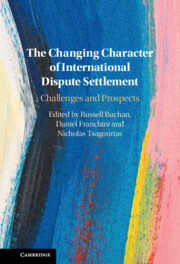Book contents
- The Changing Character of International Dispute Settlement
- The Changing Character of International Dispute Settlement
- Copyright page
- Contents
- Contributors
- Foreword
- Acknowledgements
- Table of Cases
- Table of International Instruments
- Table of Legislation
- Abbreviations
- Introduction
- Part I Recent Trends and Cross-Cutting Issues in International Dispute Settlement
- Part II Effectiveness, Authority, and Legitimacy of the Current System of International Dispute Settlement and Possible Reforms
- 5 Navigating Choppy Waters
- 6 Legitimacy in Settlement of Disputes in International Environmental Law: From Classical to Non-compliance Procedures
- 7 The Role and Legitimacy of International Human Rights Mechanisms of Dispute Settlement
- 8 Settlement of Water-Related Disputes in International Law
- 9 Coherence, Consistency, and the Reform of Investment Treaty Arbitration
- 10 The WTO DSU 2.0
- 11 The Security Council and Impartiality in the Peaceful Settlement of Disputes
- 12 International Criminal Law and the Peaceful Settlement of International Disputes
- Part III New Opportunities and the Future of International Dispute Settlement
- Index
12 - International Criminal Law and the Peaceful Settlement of International Disputes
Grand Aspirations and Minimal Impact
from Part II - Effectiveness, Authority, and Legitimacy of the Current System of International Dispute Settlement and Possible Reforms
Published online by Cambridge University Press: 14 December 2023
- The Changing Character of International Dispute Settlement
- The Changing Character of International Dispute Settlement
- Copyright page
- Contents
- Contributors
- Foreword
- Acknowledgements
- Table of Cases
- Table of International Instruments
- Table of Legislation
- Abbreviations
- Introduction
- Part I Recent Trends and Cross-Cutting Issues in International Dispute Settlement
- Part II Effectiveness, Authority, and Legitimacy of the Current System of International Dispute Settlement and Possible Reforms
- 5 Navigating Choppy Waters
- 6 Legitimacy in Settlement of Disputes in International Environmental Law: From Classical to Non-compliance Procedures
- 7 The Role and Legitimacy of International Human Rights Mechanisms of Dispute Settlement
- 8 Settlement of Water-Related Disputes in International Law
- 9 Coherence, Consistency, and the Reform of Investment Treaty Arbitration
- 10 The WTO DSU 2.0
- 11 The Security Council and Impartiality in the Peaceful Settlement of Disputes
- 12 International Criminal Law and the Peaceful Settlement of International Disputes
- Part III New Opportunities and the Future of International Dispute Settlement
- Index
Summary
In this chapter, James Mehigan focuses on the contribution of international criminal law (ICL) to the peaceful settlement of international disputes. More specifically, this chapter looks at the aims of ICL and analyses how effective it has been at achieving its international law and criminal law objectives. It argues that ICL does not make the broader contribution to dispute settlement that many commentators hope for because it provides a form of retributive justice that does not necessarily engender a sense of justice for victims, nor contribute to reconciliation or fact-finding. After looking at the impact of ICL in the Former Yugoslavia, this chapter concludes that there is little evidence to show that ICL achieves any of its aims other than individualising guilt and punishing offenders – in other words, ICL’s contribution to the settlement of international disputes is minimal and should not be overstated.
Keywords
- Type
- Chapter
- Information
- The Changing Character of International Dispute SettlementChallenges and Prospects, pp. 344 - 364Publisher: Cambridge University PressPrint publication year: 2023



